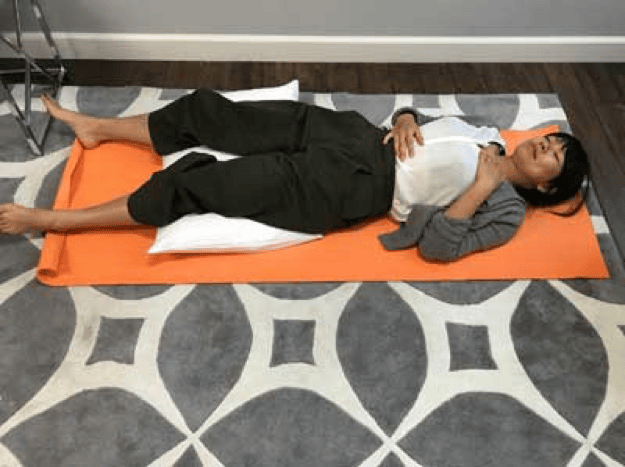The Holidays can be stressful!
Fortunately, you can help the mind and body relax with these handy techniques.
Deep Breathing
Stress and chronic pain can lead to short and shallow breathing which adds tension to the diaphragm, abdomen, and pelvic floor. Encouraging the body to breathe deeply will unravel the tension inside the body, often held in between the ribs, in the low back, neck, shoulders, belly, and pelvic floor.
Studies such as this one by Ma, Yue, Gong, et al. (2017) show that diaphragmatic breathing can improve cognitive performance and reduce negative subjective and physiological consequences of stress in healthy adults. Other studies like Roditi and Robinson (2011), show that diaphragmatic breathing can help the body break the pain cycle, thereby reducing pain and chronic pain.
Deep breathing can be practiced anywhere, especially during the holidays: stuck in a traffic jam, waiting in line at the store, or at night before you go to bed. Below are instructions for breathing on your back.
Instructions:

- Lay on your back. Knees can be bent with feet flat on the floor, or knees can be propped up on a pillow or bolster.
- Place one hand over the heart and one over the belly button.
- Inhale through the nose and feel both hands rise with the in-breath. Ribs are expanding, belly is also expanding, even the back of the body expands into the mat.
- Exhale gently and slowly, either through pursed lips or the nose. The air is slowly escaping as if you poked a hole in a tire with a needle and the air slowly passes out. The goal is to elongate the exhale, so that it is longer than the inhale.
- When the breath has been fully exhaled, pause for a second or two before beginning the breath cycle again, with another inhale. After you have exhaled wait a couple of seconds until you inhale again. Continue to breathing for 5-10 minutes.
Mindfulness
Mindfulness is a state of open awareness of the moment and being present in the body, internally and externally. Mindfulness has been shown can to reduce stress (Janssen, Heerkens, Kuijer, et al., 2018), improve relationship satisfaction (Kappen, Karremans, Burk, et al, 2018).
Marlynn Wei, M.D., J.D., offered some great tips on mindfulness during the holiday season on her blog at Psychology Today, including these favorites of mine:
- Notice your emotions. It’s easy to check out during the holidays, whether it’s at a family dinner, or a holiday party. Notice when you are feeling overwhelmed, or if emotions like happiness, joy, sadness, grief, or loneliness are present and be ok with what is going on.
- Balance holiday “should’s” with awareness of your own needs. Balance all the obligations you have on your plate with awareness of your own needs. Do you need a night to stay in instead of going to that holiday cocktail party? Could you ask guests to bring dessert instead of adding another thing to your own list? Consider taking care of your own needs to prevent feeling burnt out.
- Expand how you communicate care. Though for many cultures and families, the holidays are synonymous with giving presents, there are many other ways of showing that you care. Are there additional ways to show that you care about someone, such as spending time with them, writing them a card, telling them in person that you love them, or doing something nice and supportive?
- Practice self-care. Get regular sleep and exercise, and take time to do relaxing or fun activities in between all the holiday activities and travel. You may even find that when you take care of yourself, you are able to be nicer and more generous to others- helping you keep up with the holiday spirit.
Resources
Roditi, D., & Robinson, M. E. (2011). The role of psychological interventions in the management of patients with chronic pain. Psychology research and behavior management, 4, 41–49. doi:10.2147/PRBM.S15375
Ma, X., Yue, Z. Q., Gong, Z. Q., Zhang, H., Duan, N. Y., Shi, Y. T., … Li, Y. F. (2017). The Effect of Diaphragmatic Breathing on Attention, Negative Affect and Stress in Healthy Adults. Frontiers in psychology, 8, 874. doi:10.3389/fpsyg.2017.00874
Janssen, M., Heerkens, Y., Kuijer, W., van der Heijden, B., & Engels, J. (2018). Effects of Mindfulness-Based Stress Reduction on employees’ mental health: A systematic review. PloS one, 13(1), e0191332. doi:10.1371/journal.pone.0191332
Kappen, G., Karremans, J. C., Burk, W. J., & Buyukcan-Tetik, A. (2018). On the Association Between Mindfulness and Romantic Relationship Satisfaction: the Role of Partner Acceptance. Mindfulness, 9(5), 1543–1556. doi:10.1007/s12671-018-0902-7

